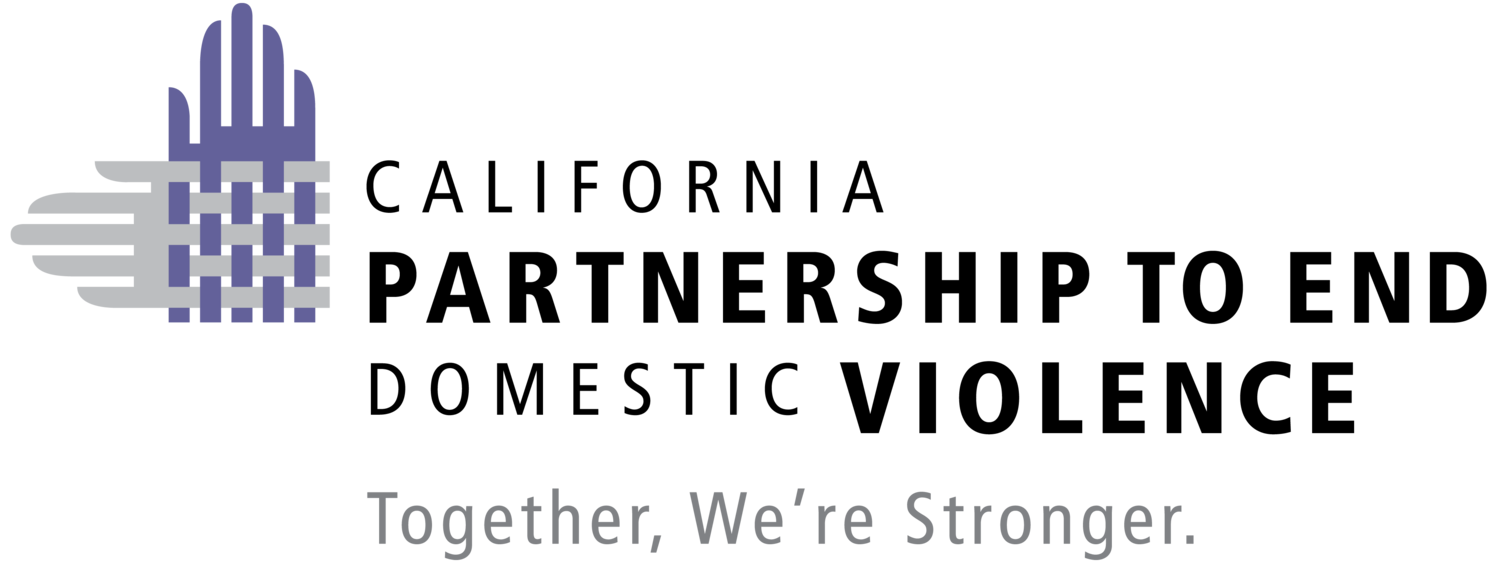Together, we’re stronger.
The challenges of 2020 are a result of the injustices that have always been present in the systems of oppression we seek to tear down. Our state has been devastated by wildfires, seen growing cases of COVID-19 amidst this ongoing pandemic, and continues to reckon with racial injustice — all of which affect survivors and our work. Even in the midst of all these struggles, the California Partnership to End Domestic Violence, our Members, and allies strive toward resiliency, choosing to celebrate change and pursue needed growth. These bright spots have been born from our resilience:
Witnessing how quickly the field was able to adapt, especially in response to COVID-19.
Being able to accelerate needed innovations in order to help survivors and our Members.
Addressing inequities in the field and recognizing the need to self-reflect on the harms our movement has caused.
Putting philosophical discussions into practice and letting actions speak louder than words.
Collaborating with organizations throughout the state to build a network out of necessity — because none of us can do this alone. And together, we are stronger.
Throughout this report, we invite you to see how we’ve put these bright spots into practice this year. We resolve to continue down this path of growth in the years to come.

EQUITY
Discussions on the Intersections Between Racial Justice and Prevention
This year has been a critical time in our history that has forced a spotlight onto the prevalent racial inequities in our country that have for too long, been ignored. It has become apparent how racism in the movement to end relationship and sexual violence has added another layer of hurt and complication for Black, Indigenous and Native, and Survivors of Color.
Upon reflecting on what needs to be done to dismantle white supremacy in the domestic violence field, we have determined that we first had to recognize that Black, Indigenous and Native advocates, preventionists and survivors of color have carried the load of racial justice work for decades—often to great professional and personal risk.
Like many, the loss of George Floyd’s life to discriminatory policing was a catalyst into realizing that this year we must do even more as an organization to address these inequities. Mr. Floyd’s death was one of far too many Black lives lost to police brutality and the harmful systems of inequity that allowed this to happen have been ignored by the field for far too long. A hashtag is not enough. For this reason, we increased our ongoing efforts to create racial equity. We issued a statement on Black Lives, but we’ve also done the work to ensure that equity continues to inform our work as we move forward. A great example of this work from this year can be seen in these clips from the Prevention Peer Network’s webinar.
Addressing Inequities in Our Movement | Colsaria Henderson, Leadership Development Specialist, Center for Excellence in Nonprofits
The Intersection between Racial Equity & Preventing Relationship & Sexual Violence | Tonjie Reese, Founder at eleven24
Teen Dating Violence Awareness & Prevention Month
Over the past few decades, prevention has become a key component to ending cycles of sexual and domestic violence, especially for future generations. The Partnership has come to recognize that our role is not to deliver messages to youth — but instead to provide opportunities for their voices and feelings to be heard by people in power, so they can learn about the root causes of violence, support peer-to-peer youth education, and become allies in building strong, equitable communities to shift social norms.
This became the inspiration behind our Teen Dating Violence Awareness and Prevention Month (TDVAPM) Campaign: Youth in the Lead for TDVAM 2020. This year, the Partnership worked to lift up young people’s wisdom and expertise in the work to prevent teen dating violence, promote healthy relationships, heal from trauma, and engage in connected forms of social justice. If this movement is to become more equitable, it is important for allies in this work to adopt a learning mindset and affirm the power of what many young activists across the globe have been able to accomplish.
Orange Day Rally Youth Voices: Healthy Relationships | Julian Suh-Toma, Youth Leader at Center for the Pacific Asian Family
TDVAM 2020 Artwork by: Anastacia Senavsky, student artist
The Partnership also recognizes that through an equity lens, young folks should be acknowledged as leaders throughout the year and not just during campaigns such as these. Sarah Khan, Youth Leadership Advocate at STAND’s Youth Against Violence program, shares her thoughts on leading prevention efforts in her community and among her peers.
Making events equitable through increased access
“The Partnership truly does everything it can to make our events more accessible. We have modified our travel assistance processes to prioritize funds for survivors, direct service staff, and those coming from rural areas. We take language access so seriously, making sure to provide interpretation to any attendees who request it, and to follow best practices when doing so. We have required our hotels to create gender neutral restrooms where they didn’t otherwise have them, asked them to go above and beyond to provide equally delicious and nutritious meals for those with allergies and dietary restrictions, and always keep accessibility at the forefront when choosing locations to host our events. Every person is equally important at Partnership events, and deserves to have the same quality experience when they attend.”
— Christina Nicosia, Meeting & Event Specialist at the Partnership
CULTURAL RESPONSIVENESS
Choosing Transformational Shifts Over Incremental Change
Long-overdue calls for racial justice have created an urgent need to leap toward transforming structural issues in our movement; to be intentional and radical in building a world with values based on equity, on Beloved Community. After releasing our statement on Black Lives, the Partnership offered our Members an opportunity to be in community with peers who wanted to honestly evaluate their structures, challenge current policies, and be self-critical in responding to the cultural inequities. A Peer Learning Circle emerged through participation in the Cultural Responsiveness Organizational Self Assessment (CROS), and became a space where each participant engages in a critical exploration of topics like patriarchy and white supremacy culture—and their impact in shaping behaviors, relationships, policies and practices, and outcomes. This continues in service of interrupting old ways based on inequality and a scarcity mindset and instead promoting relational ways based on interdependency and equity.
"It was important for me to pursue the CROS process for my organization in response to the need of clearly seeing where our strengths and opportunities for growth were in becoming a culturally responsive and anti-racist organization. Within this emergent process of promoting cross-cultural communication, racial equity and clarifying the differences in being a multicultural or diverse organization than that of an organization that is active in its efforts to explicitly name racism and anti-blackness. In addition to partnering with a local college professor to provide classes to staff and upper management on racism, applying for external funding to make the work sustainable, incorporating “Courageous Conversation Fridays to include discussion using the 1619 Project, the docuseries 13th, and our branch reading through the book “How to Be an Antiracist” despite many different perspectives and some tough unlearning of systemic normalcies that continue to marginalize BIPOC persons the CROS was a tool that was jointly fit for this transformational process of unlearning racism that exists in many organizations that do not have an awareness of what is really there by using experiential data analysis of their own workforce. Leading the racial equity and anti-racism work in my organization is a labor of purpose not passion for me, this work along with the information that the CROS process has provided us has given us a map on how to move these efforts forward and I anticipate meaningful and measurable outcomes."
— LaTysa Flowers, YMCA San Deigo
Courageous Conversations: Culturally Responsive Collaborative
By existing, the Collaborative is shining a light on the need for equitable, inclusive practices needs in our field and calling for moving towards change. We are delivering the framework by engaging with the DV field in a community-centered way. The Collaborative would not exist if advocates in the field didn’t feel the need for these practices to be enacted within organizations and our field of work.
" Our monthly Courageous Conversations are a co-creation space for our organizations to learn to do the work in a purposefully, sustainable way towards change, preventing burnout. We continue to build allyship and support systems among and within the organizations to hold each other up. Our Internal work is deliberate, exploring and peeling layers, envisioning a different way to be (being) that is not the "standard". We are moving towards a world where our organizations are known for providing Culturally Responsive Domestic Violence Services, in a community-centered way where Board & Staff reflect the communities served.
It is beautiful to witness the work of the collaborative influencing organizations."
— The Culturally Specific Collaborative Core Group
Nat Calcutta, Toni Schrader, Daniella Castaneda, Graciela Olguin, Natchawi Wadman & Constance Athyde

BELOVED COMMUNITY
Creating Community, in Spite of COVID-19
With our Support-and-Share Calls, the Partnership’s Capacity Building Team facilitated connections between Members throughout the state. Two Members in the Far North region reflect upon the ways Mercedes Tune, Capacity Building Project Specialist, helped create a sense of community.
“The support and share calls were and continue to be crucial in such uncertain times. This provided the knowledge that we are not alone and collectively we can get through these unprecedented times. Thank you Mercedes!”
“When the pandemic began, we were all overwhelmed, unsettled and concerned about the unknown. Mercedes thoughtfully curated a safe space where our agencies could gather together virtually to share ideas, create solutions and support one another.
Many of us work and reside in isolated areas of the North State and these calls gave us the opportunity to connect with other agencies in our area that were navigating through the same challenges. This process enabled us to build relationships, learn from one another and ultimately create a stronger, more cohesive region.”
Building a Community that Holds Each Other Accountable
“We have a responsibility to hear the voices in our field—the exasperation, the harm, the inequities, and the underlying systemic causes. It is our duty to learn and take action to address those inequities, counter implicit bias with inclusion, and heal the trauma inflicted within our own organizations.”
Challenging inequities and recognizing the work that Black advocates & preventionists have been doing.
In efforts to amplify and hear the voices of Black, Indigenous, and Survivors of Color, as we discussed in our Black Lives statement, we developed a blog series to learn from their experiences. Racial justice is an integral part to supporting and seeking justice for survivors of color and understanding the unique challenges they may face. To learn more about some of these challenges, please read the blog post by Carolyn Russell MA, MSW: Racial Injustice, Domestic Violence and the Shelter Movement.
Federal advocacy through CARES Act.
The Partnership pushed Congress to do more and do better to address the needs of sexual assault survivors and communities of color. Terra Russell-Slavin, Deputy Director Policy and Community Building at the Los Angeles LGBT Center made sure CARES Act funding went to LGBT programs as well as all domestic violence organizations.
Partnership
Support the Movement at Every Level: Donate to Sustain Local And Statewide Work
The truth is that our campaigns have looked much different this year than years past. This experience of quickly pivoting in order to adapt to the year’s unique challenges has been universal to many of our Members as well. Physical distancing, a recession, wildfires, and deep inequities have created real barriers to safety and community building.
That’s why we’re asking you to support both the Partnership’s work and the work of domestic violence organizations in your communities.
What changed for local organizations when COVID emerged?
Jennifer Ponce, Prevention & Education Manager at Laura’s House explains the several changes that her agency implemented with the help of the Partnership in order to adapt to COVID-19 regulations. To continue to provide resources to our Members, like Laura’s House, consider making a donation to support the Partnership.
The Partnership supports partnership!
We’re a coalition for a reason — teamwork is crucial to this movement. This is why we also want to show our support for our Members. Use our searchable map to find your local domestic violence organization and consider supporting their work as well.
Expanding Our Distance Learning Platform
Recognizing that the COVID-19 pandemic created major roadblocks in offering trainings to volunteers and colleagues that fulfill the State’s requirements for Domestic Violence Counselors, the Capacity Building Team's Cibonay Jimenez and Jasmeen Kairam took action: they added new modules and acquainted many organizations with the Distance Learning Platform this year.
Since these changes were rolled out, there has been an increase in use of the Distance Learning tool. Following its debut last year, 64 organizations and 800 advocates have now been enrolled.
“As we approached our first 40-Hour training during the pandemic, I started to feel overwhelmed. I knew that asking participants to be on Zoom for a total of 40-hours sounded exhausting to all involved. Then, I remembered that CPEDV offers distance learning in the form of online modules. I appreciated that each module utilized different learning tools – PowerPoint, videos, worksheets, and discussion boards. I’m grateful that the modules exist and I plan on using them even after we return to our in person training sessions.”
— Ashley Spencer, House of Ruth
“ The staff at CPEDV, particularly Jasmeen Kairam, were very helpful in assisting us with getting new people connected to the training as well as in providing technical assistance. The Distance Learning Program has provided us new flexibility in training and has allowed us to get more people trained faster. In the future, as COVID-19 restrictions begin to be lifted, we anticipate continuing to utilize the Distance Learning Program as a tool to spread knowledge to those interested in expanding their knowledge of domestic violence advocacy.” — Quinton Page, DOVES of Big Bear Valley
Fostering Non-Traditional Partnerships for COVID-19 Relief
With COVID-19 creating a greater need for financial assistance, the Partnership pushed the Governor’s office to provide emergency funding and secure aid from non-traditional partners, such as Uber & AirbBnB.
This effort was made by the possible by the quick mobilization of our Policy team. In the words of our Public Policy Director, Krista Niemczyk, this is how the Partnership was able to use these new relationships in order to help survivors:
“Immediately when Shelter In Place requirements went into effect, we heard from members about the urgent need for hotel space to provide social distancing and support survivors needing safe housing, and the immense cost they were incurring. We also heard about the rush to secure PPE, basic cleaning supplies, and the tools staff would need to work remotely. Responding to the immediate funding and support needs required us to get creative about how to meet the need. While we were advocating for the Governor to provide direct funding support to programs, we were also lifting up some of those specific areas need such as safe hotel stays and transportation. We’re very thankful to the Governor’s office for facilitating connections with Airbnb and Uber, and supporting the use of existing VOCA funds for emergency grants to the field.”
As we expand our understanding and practices of what it means to heal violence, we worked to deepen funding support for partners whose mission are the same: to end the multitude of systemic harms that contribute to domestic violence. Organizations not typically considered DV organizations, but that are doing this critical work all the same, were recipients of these awards. This is what two grant recipients had to say about receiving relief funds:
“At Fathers & Families of San Joaquin we look toward love as a guiding star to equip us with the necessary tools to heal our families and make them whole after being shattered by systemic oppression wrought with violence that often manifests in the home. Without visionary partners like CPEDV, these reinvestments into our vulnerable communities would not be possible. We heal best when we heal together.”
“The California to End Domestic Violence emergency COVID grant was such a tremendous blessing for our tribal communities in Northern California. We were able to assist in emergency relief services to over twenty-five Native families impacted by domestic violence and COVID -19. Thank you for all your support!”
Healthy Manhood and Fighting for Gender Justice in Our Communities
This year, the Partnership collaborated with the Alliance for Boys and Men of Color to host the workshop HEALING TOGETHER: Healthy Manhood and Fighting for Gender Justice in our Communities.
Together, we analyzed ways to expand the movement to become ever-more inclusive, because we believe that everyone has a role in ending domestic violence. There were rich discussions between domestic violence advocates, Members of the Alliance for Boys and Men of Color, youth of color, and boys and men of color—exploring gender socialization as a means to challenge controlling behavior among their peers, while they simultaneously confront the oppression of white supremacy on a daily basis.
Workshop attendees anonymously shared their feedback on what their greatest takeaways were from this workshop:
In what ways were you able to take the Healing Together learnings back to your work, especially in the area of engaging boys and men of color?
“The training changed my perspective on what it meant to be a feminist, a supporter of the men in my world and my behavior. That changed everything. ”

BRAVERY
Creating Space for Prevention In Spite of an Uncertain Future with Funding.
The Partnership and California Coalition Against Sexual Assault called on Governor Newsom to protect $5 million for sexual and domestic violence prevention—funding that had been promised to organizations last year, but was jeopardized in the May Revise. As a result of our policy advocacy, the Governor and legislature reached a budget agreement that protected it. In the face of COVID-19, determination from not only our staff, but members was required in order to keep the efforts of this movement ongoing. The following quotes demonstrate the insight and courage that was at the core of this push for securing funding, from both of these perspectives.
“At the start of the COVID-19, we heard from members throughout the state about increased hotline calls, and an increase in the severity of abuse. We need to remember that home is not currently a safe place for everyone. Domestic and sexual violence are not inevitable, and this is why we fought to defend FY 19 prevention funding in the state budget. As a result of the historic state budget deficit resulting from COVID, Governor Newsom proposed in May to revert the prior year domestic and sexual violence prevention funds. We immediately coordinated with CALCASA to speak with the Governor’s staff and the legislature’s budget committee staff to express the dire consequences of cutting those funds. We also reached out to prevention grantees across the state who provided information to legislators emphasizing the importance of this funding and the work done on the ground in their communities. We were successful in protecting these funds, and will continue to stand in our values with our members to advocate for future prevention funding.”
“We at NEWS know that with all of the stressors families and youth are under right now, our prevention programs are an essential tool for our youth to establish and maintain healthy social connections. What we offer gives youth a safe place to talk about the difficult things they are experiencing at home and with their peers. We have been building programs over the years that are effective in preventing violence, now is not the time to fall backward, but this is actually a time to step up our efforts. For this reason, we are especially grateful for the SD program, and believe strongly that it was worth the effort and advocacy it took to get this support.”
Alejandrina Carrasco, MA, Interface Children & Family Services explains how the SD grant impacted her organization’s work, and also commented on why it is essential for policymakers to make funding for prevention efforts ongoing: “It’s essential for policymakers to make prevention funding an ongoing priority, prevention is not a one and done effort. To truly end violence in our communities, we all need to consistently work together to adopt prevention as a way of life, a way of being and engaging with our community to see ongoing change and maintain this change. We need to be consistent with our efforts and remain hopeful and patient with the process of change.”
Strengthening Economic Supports for Paid Leave
As a result of COVID-19, workers across the state and their families felt the impact on their jobs and income, making the need for paid leave, unemployment, and other related benefits more apparent than ever.
This disparity was bravely addressed by our Prevention Team who worked with our partners at the California Work & Family Coalition to increase access to these benefits — especially among immigrants and low-wage earners —through a network of community leaders, and came together to provide access to and advocate for trainings, resources, and benefits that are accessible and timely. Jenya Cassidy, Director of the California Work & Family Coalition further explains more about this campaign:
FINANCIALS
July 2019 - June 2020
Revenue
Expenses
MEMBER AWARDS
Funds Awarded to Members
% of Expenses
BALANCE SHEET
GRANTORS
Blue Shield of California Foundation
Office on Violence Against Women (OVW), Department of Justice
U.S. Department of Health & Human Services, Centers for Disease Control & Prevention
Women’s Foundation of California
Pinpoint Foundation
U.S. Department of Health & Human Services, Administration for Children & Families, Administration on Children, Youth & Families, Family & Services Bureau, Family Violence Prevention & Services
California Governor’s Office of Emergency Services
THE PARTNERSHIP BY THE NUMBERS
317
Total Members
3,198+
Number of People Trained
243
Responses to Help Desk Inquiries
1.035m
Social Media Impressions
PARTNERSHIP STAFF
Alejandra Aguilar, MA
Statewide Prevention Program Specialist
NATALIE DIAZ MONDRAGON
Administrative Assistant
Paul Castro
Interim Executive Director
Michell Franklin, MA
Capacity Building Program Manager
Melissa Guajardo
Administrative Director
JASMEEN KAIRAM
Capacity Building Coordinator
jacquie marroquin
Director of Programs
Christina Nicosia
Meeting & Events Specialist
Christine Smith
Public Policy Coordinator
Megan Tanahashi
Communications Coordinator
Cibonay Jimenez
Capacity Building Program Coordinator
MARCELLA MAGGIO
Prevention Coordinator
Jessica Merrill
Communications Manager
Krista Niemczyk, MPP
Public Policy Director
Miranda Stiers
Prevention Program Specialist
Mercedes Tune
Capacity-Building Program Specialist
PARTNERSHIP BOARD
Colsaria Henderson, President
Leadership Development Specialist, Center for Excellence in Nonprofits
Anna Conti, Vice President & Los Angeles Regional Representative
Executive Director, Su Casa - Ending Domestic Violence
Aiko Pandorf, Secretary
Non-Profit Consultant
Gayle Guest-Brown, Treasurer
Executive Leadership Coach, Trainer and Speaker, Guest Brown Impact
Saara Ahmed, Bay Area Regional Representative
Community Resource Coordinator, Asian Women's Shelter
Hisham Alibob
Policy & Communications Manager, Contra Costa County Alliance to End Abuse
Alejandrina Carrasco, Central Coast Regional Representative
Prevention Services Program Manager, Interface Children & Family Services
Cristal B. Gleason, Central Valley Regional Representative
Emergency Services Manager, Haven Women’s Center of Stanislaus
Amanda Jancu
Senior Attorney, Los Angeles Center for Law and Justice
Melissa Luke
Domestic Violence Program Manager, Asian Americans for Community Involvement (AACI)
Chivas Mays
Housing Manager, Stand Up Placer
Pamela Mejia
Senior Media Researcher, Berkeley Media Studies Group
Rebecca Nussbaum, Southern Regional Representative
Associate Director of Programs, Community Resource Center
Dina Polkinghorne
Executive Director, Project Sanctuary
Jennifer Ponce
Prevention & Education Manager, Laura’s House
Gina Roberson, North Regional Representative
Chief Program Officer, WEAVE
Jeanne Spurr, Far North Regional Representative
CEO, Empower Tehama
Special Acknowledgements
The Partnership affirms that the best ideas come from having everyone at the table in our Theory of Change. This year, we welcomed new folks to the table and also would like to acknowledge those who have moved to another table, but will always have a seat at ours.
NEW STAFF
Melanie Choy - Administrative Coordinator
Marcella Maggio - Prevention Coordinator
Megan Tanahashi - Communications Coordinator
NEW BOARD MEMBERS
Hisham Alibob - Policy & Communications Manager, Contra Costa County Alliance to End Abuse
Cristal B. Gleason - Central Valley Regional Representative
Amanda Jancu - Senior Attorney, Los Angeles Center for Law and Justice
Dina Polkinghorne - Executive Director, Project Sanctuary
Jennifer Ponce - MSW, CHES, Prevention & Education Manager, Laura’s House
Gina Roberson - North Regional Representative, Chief Program Officer, WEAVE
FORMER STAFF - THANK YOU!
Melanie Choy - Administrative Coordinator
Neha Malik - Administrative Assistant
Allison Stelly - Development Specialist
FORMER BOARD MEMBERS - THANK YOU!
Adriana Caldera
Misti Clark-Holt
Saima Husain
Jolanda Ingram-Obie
Jessica Reynaga
Rabeya Sen
Liz Soto
Alison Tudor
















